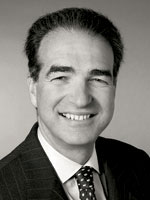Robert D. Joffe ’67, former presiding partner of Cravath, Swaine & Moore and an active member of the HLS alumni community, died Thursday, Jan. 28. He was 66.
“Robert Joffe was a superb lawyer and a true leader in the legal community,”
said HLS Dean Martha Minow. “His wisdom, judgment, and intellect infused his deep commitments to enhancing justice and the rule of law around the world and his outstanding service to this law school. We join so many others in mourning the loss of this trusted adviser, friend, and exemplary member of the bar.”
Joffe was a lawyer with Cravath, Swaine & Moore for 42 years. He began his career at the firm following his graduation from HLS, and, with the exception of two years spent with the justice ministry in Malawi on a fellowship funded by the Ford Foundation, spent his entire career there. Joffe handled civil rights cases on a pro bono basis throughout his career with Cravath, including a case in which he represented black firefighters in Alabama (Martin v. Wilks) before the United States Supreme Court.
His practice at Cravath focused primarily on advising independent directors on corporate boards. He was the lead outside attorney for Time Warner Inc., and represented the company through its mergers with Warner Bros. and AOL. He also represented the company in the landmark Paramount v. Time lawsuit of 1989, where he won a critical victory for Time.
In addition to his work on behalf of Time Warner, Joffe also represented the independent directors of General Motors Co., Citigroup Inc. and Merrill Lynch & Co. before its purchase by Bank of America Corp. In 2008, he represented the independent directors of Fannie Mae as the company was placed under federal conservatorship and he was recognized by “The American Lawyer” as a 2008 Dealmaker of the Year for his work on that case.
At HLS, Joffe was a member of the Dean’s Advisory Board for 13 years and he was a supporter of the Center on Lawyers and the Professional Services Industry, part of the Program on the Legal Profession. He was a member of what Professor David Wilkins, director of the Program on the Legal Profession, described as the Center’s “dream team advisory board.”
